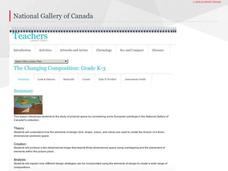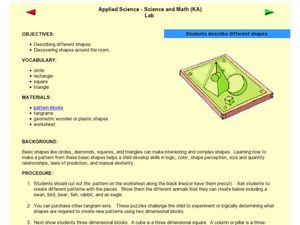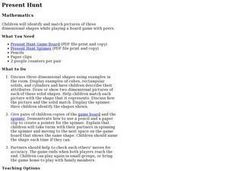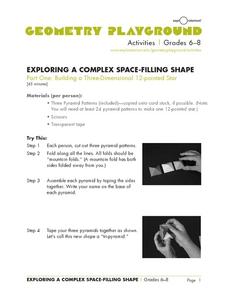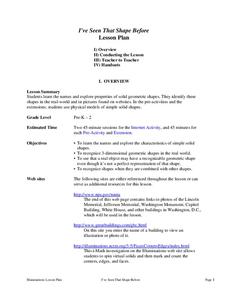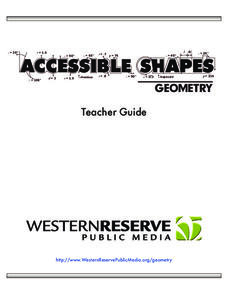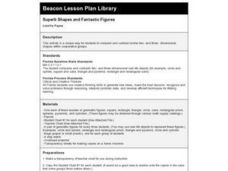Radford University
Coal Silo Design Task
The coal is mined. Now what? Scholars design a coal silo that stores mined earth using at least two different three-dimensional shapes. They calculate the volume, determine the amount of mined earth produced in a day, and find the amount...
Curated OER
Children's Museum of Houston - Pre/Post Classroom Activities - Nets
Young scholars make three dimensional shapes with nets. In this nets lesson, students receive nets which they fold to make a three dimensional object. They predict what shape each net will make and verify it after making the net. They...
Utah Education Network (UEN)
Insides and Outsides
Give small groups handfuls of unit cubes and then dare them to build as many rectangular prisms as possible using only 12 cubes. This engaging activity serves as an introduction to the volume of solid figures. In addition to volume,...
Curated OER
Using Geometric Shapes in Architecture
Third graders identify two and three dimensional shapes used in architectural designs by viewing images on the Internet. In this geometry lesson, 3rd graders create their own building designs and identify the geometric shapes that will...
Curated OER
Circles to Spheres
Students investigate circles and spheres. In this space shapes activity, students compare and contrast two-dimensional and three-dimensional shapes. Students investigate the relationship between plane and space shapes.
Space Awareness
What is a Constellation
Why do some stars in a constellation appear brighter than others? Using a get-up-and-move astronomy activity, scholars explore perspective and the appearance of constellations in the sky while developing an understanding of the...
Charleston School District
Volume of Composite Shapes
It's the parts that make the whole. Learners apply volume formulas to composite figures to find the total volume of the figure. Previous lessons in this series taught the methods for finding the volume and/or dimensions of...
Curated OER
Using 2 and 3 Dimensional Geometric Shapes
Students explore geometry by participating in a shape identification activity. In this figure dimensions instructional activity, students identify the difference between 2 and 3 dimensional shapes by their vertices and faces. Students...
National Gallery of Canada
The Changing Composition
Play with dimensions and practice making a two-dimensional scene look three-dimensional. Class members view pieces of art and then make their own scenes by layering different materials and drawing in details. Check out all the tabs for...
Curated OER
Applied Science - Science and Math Lab
Learners investigate topology. For this Applied Science lesson students explore higher, more abstract mathematics using tangles. Learners make topologically related shapes.
Curated OER
Applied Science - Science and Math (K) Lab
In this shape lesson, learners cut out tangram shapes and create different pictures with them. They look at 3-D shapes as well. There is a nice, hands-on component built into this lesson.
Mathematics Vision Project
Module 5: Modeling with Geometry
Solids come in many shapes and sizes. Using geometry, scholars create two-dimensional cross-sections of various three-dimensional objects. They develop the lesson further by finding the volume of solids. The module then shifts to finding...
American Museum of Natural History
Thinking in the Three Dimensions
Discover different dimensions with paper folding. Pupils first read about zero, one, two, and three dimensions, and then learn about the fourth dimension, time. They then use origami to create models of shapes in three dimensions and use...
Cold Spring Harbor Laboratory
The DNA Molecule Is Shaped like a Twisted Ladder
One of the first models of DNA appeared to be a triple helix. Young scientists learn about the many scientists who worked to find the shape of DNA. They observe multiple models, tests, and experiments to understand the conclusions. An...
Curated OER
Present Hunt
Learners identify and match pictures of three dimensional shapes while playing a board game with peers. They take turns with their partners in spinning the spinner and moving to the next space on the game board that shows the same shape.
Curated OER
Paper Folding to Make Cubes
Examine patterns of figures composed of six-squares and predict which of the twenty presented could be folded to make a cube. They then fold large-scale patterns of these figures to confirm their hunches.
Curated OER
2-D and 3-D Presents at Pedro's Party
Fifth graders draw 2-D and 3-D shapes. They sketch and label geometric figures with correct terminology, then explore parallel and perpendicular lines. Pupils sort and classify shapes drawn.
Exploratorium
Exploring a Complex Space-Filling Shape
Middle schoolers build a three-dimensional 12-pointed star as a geometric exercise. The shape is quite-difficult to construct. Luckily there is an excellent template that learners cut out, then use to make their pyramid. The second part...
Fayetteville Public Schools
I've Seen That Shape Before
The objectives in the resource allow students to explore the characteristics of simple solid shapes. Youngsters learn to recognize the face shapes, corners, and edges that make up 3-D figures by filling in a chart. Lastly, learners look...
PBS
Accessible Shapes
All the 2-D and 3-D measurement work you need is in one location. Divided into three sections, the geometry lesson plans consist of visualization of three dimensions, classifying geometric figures, and finding surface area and volume....
Curated OER
Superb Shapes and Fantastic Figures
Students compare and contrast similar two and three dimensional shapes within cooperative groups.
Curated OER
Geometry, Shapes and Public Sculpture
Students explore characteristics of geometric shapes. They observe geometric shapes and forms in public sculpture. Students create a unique sculpture of their own using basic three dimensional shapes. Additional cross curriculum...
Curated OER
Shape Tool
Students explore various polygons and examine how shapes can be manipulated in a variety of ways. In this shape tool lesson, students identify geometric shapes in two dimensions. Students identify and draw one line of symmetry in a...
DiscoverE
LIDAR: Mapping with Lasers
We would be lost without maps! How are they made? Introduce junior topographers to LIDAR technology with a fascinating activity. Set up a mock city, then have learners operate a laser measure to determine the shape of the landscape using...










